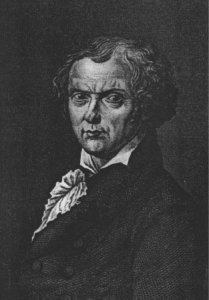Sunset
(Poet's title: Das Abendrot)
Set by Schubert:
D 627
[November 1818]
Du heilig, glühend Abendrot!
Der Himmel will in Glanz zerrinnen,
So scheiden Märterer von hinnen,
Hold lächelnd in dem Liebestod.
Des Aufgangs Berge still und grau,
Am Grab des Tags die hellen Gluten,
Der Schwan auf purpurroten Fluten
Und jeder Halm im Silbertau.
O Sonne, Gottesstrahl, du bist
Nie herrlicher, als im Entfliehn,
Du willst uns gern hinüber ziehn,
Wo deines Glanzes Urquell ist.
Sacred, glowing sunset!
The sky wants to melt in a blaze.
Thus it is that martyrs leave this dimension,
With a beauteous smile in their love-death.
At sunrise the mountains are quiet and grey;
At the day’s grave they are burning brightly.
The swan on crimson waters,
And each blade covered in silver dew!
Oh sun, God’s radiance, you are
Never more majestic than when you depart.
You are keen to carry us over there,
Where the original source of your shining is located.
All translations into English that appear on this website, unless otherwise stated, are by Malcolm Wren. You are free to use them on condition that you acknowledge Malcolm Wren as the translator and schubertsong.uk as the source. Unless otherwise stated, the comments and essays that appear after the texts and translations are by Malcolm Wren and are © Copyright.
☙
Themes and images in this text:
Dew East and West Evening and the setting sun Fire Floods and tides Graves and burials Grey Heaven, the sky Here and there Martyrs and martyrdom Melting Morning and morning songs Mountains and cliffs Noise and silence Rays of light Silver Smiling Springs, sources and fountains The sun Swans
Although ‘grave thoughts at sunset’ was a well-established literary theme, Schreiber was probably the first poet to have rhymed ‘Abendrot’ (sunset, literally ‘evening red’) with ‘Liebestod’ (love-death). He here presents the blazing rays of the setting sun in contrast to the cold light of dawn, when the eastern mountains are silent and grey. However, they catch fire as the sun descends into ‘the grave’ of day. Similarly, martyrs as they approach the grave are illuminated by a shining smile. All of this radiance has its source in a different dimension, onto which a portal is opened at the moment of sunset.
Many other poems in the tradition of meditating on the setting sun offer hope based on the certainty of tomorrow’s sunrise (usually taken by conventionally pious poets as a promise of resurrection after our own demise), but that is not quite what is contemplated here. In Schreiber’s text the sun has little to offer in the morning. It is only in its departure that it reveals anything of the splendour that speaks of hope. We need to leave this dimension. This earth, human life included, needs to melt in the passionate heat of death. Liebestod.


☙
Original Spelling Das Abendroth Du heilig, glühend Abendroth! Der Himmel will in Glanz zerrinnen, So scheiden Märtyrer von hinnen Holdlächelnd in dem Liebestod. Des Aufgangs Berge still und grau, Am Grab des Tags die hellen Gluthen, Der Schwan auf purpurrothen Fluthen, Und jeder Halm im Silberthau! O Sonne, Gottesstrahl, du bist Nie herrlicher, als im Entfliehen, Du willst uns gern hinüber ziehen, Wo deines Glanzes Urquell ist.
Confirmed by Peter Rastl with Schubert’s source, Aloys Schreiber’s Gedichte. Erster Theil. Neueste Auflage. Wien 1817. Bey B. Ph. Bauer, pages 68-69; with Poetische Werke von Aloys Schreiber. Erster Band. Tübingen, bei Heinrich Laupp. 1817, page 67; and with Solothurnisches Wochenblatt für 1815. Herausgegeben von Freunden der vaterländischen Geschichte. Solothurn bey Ludwig Vogelsang, obrigkeitlichem Buchdrucker, Nro. 45. Samstag, den 11 November 1815, page 592.
To see an early edition of the text, go to page 68 [76 von 272] here: http://digital.onb.ac.at/OnbViewer/viewer.faces?doc=ABO_%2BZ160628102


